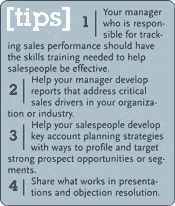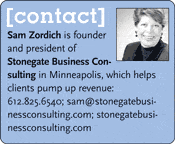Tanner Montague came to town from Seattle having never owned his own music venue before. He’s a musician himself, so he has a pretty good sense of good music, but he also wandered into a crowded music scene filled with concert venues large and small.But the owner of Green Room thinks he found a void in the market. It’s lacking, he says, in places serving between 200 and 500 people, a sweet spot he thinks could be a draw for both some national acts not quite big enough yet for arena gigs and local acts looking for a launching pad.“I felt that size would do well in the city to offer more options,” he says. “My goal was to A, bring another option for national acts but then, B, have a great spot for local bands to start.”Right or wrong, something seems to be working, he says. He’s got a full calendar of concerts booked out several months. How did he, as a newcomer to the market in an industry filled with competition, get the attention of the local concertgoer?
Sales
business builder sales
How to sell more in uncertain times
by Sam Zordich
You’re in good company if your sales are flat and your customers are taking twice as long to make decisions. Organizations throughout the country and across all industries are experiencing little or no growth in sales revenue and little to no profit.
More than merely a discouraging turn of events after a decade of unprecedented growth, small-business owners are facing a sales crisis for which they are ill equipped. Larger, well capitalized firms can wait out a poor economy, fierce competition, a war, and even discontinuity in business leadership. But smaller firms don’t have that option.
What can smaller, entrepreneurial companies do to help optimize the sales revenue that is essential for survival?
First, adapt and get real. Get rid of timeworn ideas about the qualities of good salespeople. Apply recognized, effective management practices. Train salespeople to communicate effectively with new buyers.
Popular business literature is full of myths about salespeople and the best ways to sell. These myths mislead owners into deciding on poor hires, excusing poor performance,
and neglecting basic management practices. The biggest myth is that salespeople are radically different from other employees.
Owners who support the myth that salespeople are motivated only by money throw more money at salespeople to increase their performance. When sales continue to lag, the owner blames it on lack of ambition or training. Ultimately, the salesperson is sent to another workshop or dismissed.
Certainly, a salesperson is responsible for generating money — for your company. And like all employees, salespeople need individualized recognition, rewards and feedback about their work. It is a mistake to assume that an increase in commissions alone will change behaviors without good management in place to provide necessary feedback, guidance and structure to support those changes.
Second, hire the right people. Another destructive belief: Anyone can be taught to sell. Recent research from the Harvard School of Business has uncovered the eye-opening statistic that less than 5 percent of those directly responsible for closing sales are able to ask the prospect for a commitment. Knowing what needs to be done and doing it are not synonymous.
Therefore, before you hire, make sure expectations are clear and accountabilities documented. Check references carefully. Ask to speak with former customers. Have the applicant recount a situation where he or she encountered strong resistance and yet made the sale.
Hiring the right salespeople requires careful analysis. Don’t mistake “happy noise” and excellent interviewing skills as salesmanship. Some of the best closers I’ve known do not have the “curb appeal” of sparkling interviewees.
Take note of subtle listening and observation skills that successful salespeople use to uncover unstated problems. Count the number of questions you are asked during the interview. Voice misgivings you may have about an applicant, and see how the person addresses concerns.
Unfortunately, until recently there has been little professional research regarding sales, less than a dozen undergraduate sales degree programs, and no post-graduate sales programs to dispel these deceiving beliefs.
Now, optimize selling time. Over the last decade, pursuit of operating excellence has “right-sized” corporate structures in which fewer people are expected to perform a wider variety of tasks. As the economy slowed and prospects took longer to make decisions and expected more supporting materials, it became apparent that salespeople were not spending nearly as much time in front of prospects as before. Their proposal “hit” rate dropped from 2 out of 3 to 1 in 5.
The expectation that salespeople should be able to handle the entire sales process, from lead generation to negotiations, severely limits use of their strength — the face-to-face meeting. To eliminate this barrier to vigorous sales, examine the tasks your salespeople are expected to perform and transfer the ones that don’t require personal contact or preparation for personal contact to another person in your organization.
As a salesperson once told me, “I didn’t go into sales to sit at a desk and do paperwork.” During this economy, it’s essential for your salespeople to get in front of prospects. People simply aren’t making purchases sight unseen any longer; they need to see who they’re buying from.
Owners with already limited funds and only a general understanding of the sales process make these costly mistakes most often:
• Put sales managers into the position of having to sell.
• Place their star salesperson in the position of manager.
• Expect salespeople to do it all.
A cost-efficient way to improve sales is to develop or document a sales process. This enables your manager to develop realistic methods of tracking and managing sales performance. It also restores the salespeople’s accountability.
Once you have a documented sales process, assign groups of tasks to various people. Don’t expect one person to be really good at keying in contact information, making effective phone calls, developing killer presentations, and getting the prospect to a place of clarity.
For example, if you buy lists, contract with a telemarketer to update the contact list that your marketing department generates, use a researcher to qualify prospects. Always free up your salespeople so they can be in front of the prospect.
And please, talk the talk. The language of selling has changed radically. It’s even more important for small businesses to be able to speak the new language fluently or they lose the buyer right away for lack of credibility.






